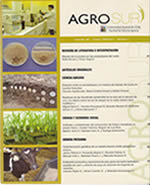Genetic variants of bovine beta casein: relationship with production, milk technological traits and human health
Main Article Content
Abstract
Milk is a fundamental feed of all newborn mammals and a good source of proteins, fatty acids, micro elements, calcium, phosphorus, among others, for non-lactating humans. As world demand for foods increases, so does the concern and requirements of consumers for food quality and safety. In view of evidences of possible pathologies associated to milk consumption, detractors of the dairy industry have appeared, making use of these arguments. Research on the risks associated to milk ingestion has been conducted on the last twenty years and the existence of specific milk protein variants able to cause disorders such as milk intolerance, diabetes mellitus type 1, ischemic heart disease and food allergies, has been established. The determination of casein genetic variants and the association of the A1 beta-casein with human health disorders represent an opportunity, for the farmers to select replacements, retaining those cows with the desirable alleles, and also for the dairy industry to obtain safer dairy products. As a result, all the dairy supply chain, from producers to consumers, will be benefited.

